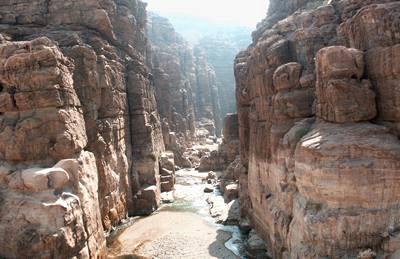Ammon News - By Hana Namrouqa
MUJIB NATURE RESERVE - The Mujib Nature Reserve is expected to be declared a biosphere reserve at the end of this month, thus achieving international recognition for Jordan's jewel of eco-tourism, according to officials.
UNESCO is expected to declare the reserve a biosphere on June 28, according to Mujib Nature Reserve Director Hisham Dheisat.
"Once declared, Jordan will become host to two biosphere reserves: Dana Biosphere Reserve and Mujib," he told reporters during a media tour of the Mujib Nature Reserve over the weekend, organised by the Royal Society for the Conservation of Nature (RSCN).
Biosphere reserves are internationally recognised areas of terrestrial and coastal ecosystems promoting solutions to reconcile the conservation of biodiversity with its sustainable use, according to the UNESCO website.
Biosphere reserves serve in some ways as “living laboratories” for testing out and demonstrating integrated management of land, water and biodiversity, the website said.
There are over 500 biosphere reserves in over 100 countries, 25 of which are located in the region, Dheisat noted.
UNESCO’s recognition of a site as a nature biosphere can raise awareness on environmental and development issues among local communities and government authorities, according to the agency.
It can also help attract additional funding from different sources, while at the national level, biosphere reserves can serve as learning sites to explore and demonstrate approaches to conservation and sustainable development.
Dheisat said Mujib Nature Reserve was nominated to become a biosphere reserve because of its unique biodiversity, ecosystems and location.
"Mujib is home to high-altitude summits and waterfalls and it is the world's lowest-altitude nature reserve… named after the 13-square-kilometre area Mujib Valley, which runs through it," he noted.
Spread over a 212-square-kilometre area, the reserve is home to seasonal and permanent rivers that flow through several valleys, enabling the arid area to support diverse ecosystems and providing vital water resources for the shrinking Dead Sea.
The complex drainage system in the reserve is characterised by three large catchments: Wadi Mujib, Wadi Hidan and Wadi Zarqa Maeen, with permanent water flow throughout the year.
The richest vegetation is found in the valleys, including palm, wild fig and tamarix trees, and oleander shrubs, as well as reed beds along the river, according to the RSCN.
"Surveys indicate that the Mujib reserve is home to over 412 species of plants, 24 mammals, three fish species and 150 species of birds," Dheisat highlighted.
The reserve is strategically important for bird migration as well, Abdul Razzaq Hmoud, the national component manager of an RSCN project for the conservation of migratory soaring birds along the Rift Valley/Red Sea Flyway, underscored.
"Because Mujib is located on the Rift Valley-Red Sea Flyway, the world's second-most used route which hosts more than 1.5 million migratory birds during the spring and autumn, it is a vital site for migratory birds, especially soaring birds," he told reporters.
Mujib Nature Reserve is categorised as a “bottleneck site” for migrating birds, which stop over in the area to rest, feed and nest, Hmoud said.
A total of 37 types of migratory soaring birds, which maintain flight by using rising air currents, travel on the Rift Valley-Dead Sea Flyway annually, according to the RSCN.
At least five of these are globally endangered, such as white and black storks, buzzards, eagles and vultures.
*Jordan Times
